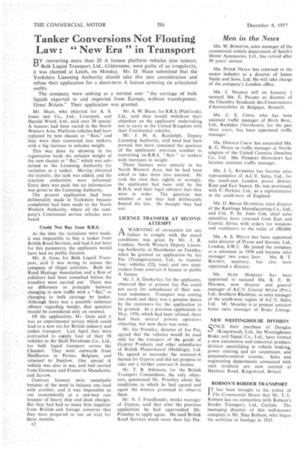Tanker Conversions Not Flouting Law: "New Era" in Transport
Page 46

If you've noticed an error in this article please click here to report it so we can fix it.
Bl ,....onverting more than 20 A licence platform vehicles into tankers, Bulk Liquid Transport, Ltd., Gildersome, were guilty of an irregularity, it was claimed at Leeds, on Monday. Mr. D. Mace submitted that the Yorkshire Licensing Authority should take this into consideration and refuse their application for a short-term A licence covering six articulated outfits.
The company were seeking as a normal user "the carriage of bulk liquids exported to and imported from Europe, without transhipment, Great Britain." Their application was granted.
Mr. Mace, who objected for A. S. Jones and Co., Ltd., Liverpool, and Harold Wood, Ltd., said over 20 special A licences had been varied in the North Western Area. Platform vehicles had been replaced by new chassis or "flats," and they were then converted into tankers, with a big increase in unladen weight.
This was done by showing in the registration book the unladen weight of the new chassis or "fiat," which was submitted to the Licensing Authority for variation as a tanker. Having obtained the transfer, the tank was added, and the taxation authorities were informed. Extra duty was paid, but no information was given to the Licensing Authority.
The present application had been deliberately made in Yorkshire because complaints had been made to the North Western Authority, where all the company's Continental service vehicles were based.
Could Not Buy from B.R.S.
At the time the variations were made, it was impossible to buy a tanker from British Road Services, and had it not been for this manceuvre, the applicants would have had no public licences.
Mr. A. Goss, for Bulk Liquid Transport, said it was wrong to accuse the company of illegal activities. Both the Road Haulage Association and a firm of solicitors had been consulted before the transfers were carried out. There was no difference in principle between changing to new traffic with a "flat," or changing to bulk carriage by tanker. Although there was a possible technical offence regarding weight, that question should be considered only on renewal.
Of the application, Mr. Goss said it was an experimental service which could lead to a new era for British industry and tanker transport. Last April they were contracted to supply four of their 58 vehicles to the Shell Petroleum Co., Ltd., for bulk liquid transport across the Channel. They went outwards from Shellhaven to Pernes, Belgium, and returned to Stanlow, One special A vehicle was also in use, and had carried from Germany and France to Manchester and Jarrow.
Contract licences were unsuitable because of the need to balance one load with another, and it was impossible to run economically at a one-way rate because of heavy ship and dock charges, But they had had so many firm inquiries from British!) and foreign concerns that they were prepared to run on trial for three months.
r') Mr. A. W. Blane, for B.R.S. (Pickfords). Ltd., said they would withdraw their objection on the applicants' undertaking not to carry in the United Kingdom with their Continental vehicles.
Mr. J. H. A. Randolph. Deputy Licensing Authority, said need had been proved, but there remained the question of the applicants' previous conduct in converting ex-B.R.S. " flats " to tankers with increases in weight.
Those licences were entirely in the North Western Area. but he had been asked to take them into account. He took the view, that, rightly or wrongly, the applicants had been told by the R.H.A. and their legal advisers that they were in order. The question was whether or not they had deliberately flouted the law. He thought they had not.
LICENCE TRANSFER AT SECOND ATTEMPT
AWARNING of revocation for any failure to comply with the stated conditions was given by Mr. J. R. I.indsay, North Western Deputy Licensing Authority, at Manchester on Tuesday, when he granted art application by Jay Pee (Transportation), Ltd., to transfer four vehicles (24 tons) and two semitrailers from contract-A licence to public A licence.
Mr. J. A. Dunkerley, for the applicants, observed that at present Jay Pee could not carry for subsidiaries of their contract customers. Transport was costing too much and there was a genuine desire by ,much
customers for the application to be granted. In a previous application in May, 1956, which had been refused, there had been several private operators objecting, but now there was none.
Mr. Joe Priestley, director of Jay Pee, agreed that the vehicles would be used only for the transport of the goods of Gyproc Products and other subsidiaries of British Plasterboard (Holdings), Ltd. He agreed to surrender the contract-A licence for Gyproc and did not propose to take out a further contract-A licence.
Mr. T. B. Atkinson, for the British Transport Commiftion, the only objectors, questioned Mr. Priestley about the conditions to which he had agreed and again the witness promised to observe them.
Mr. N. J. Freedlander, works manager of Gyproc, said that after the previous application he had approached Mr. Priestley to apply again. He used British Road Services much more than Jay Pea
























































































































